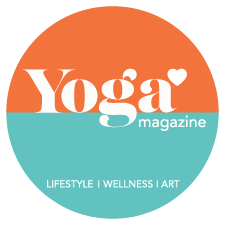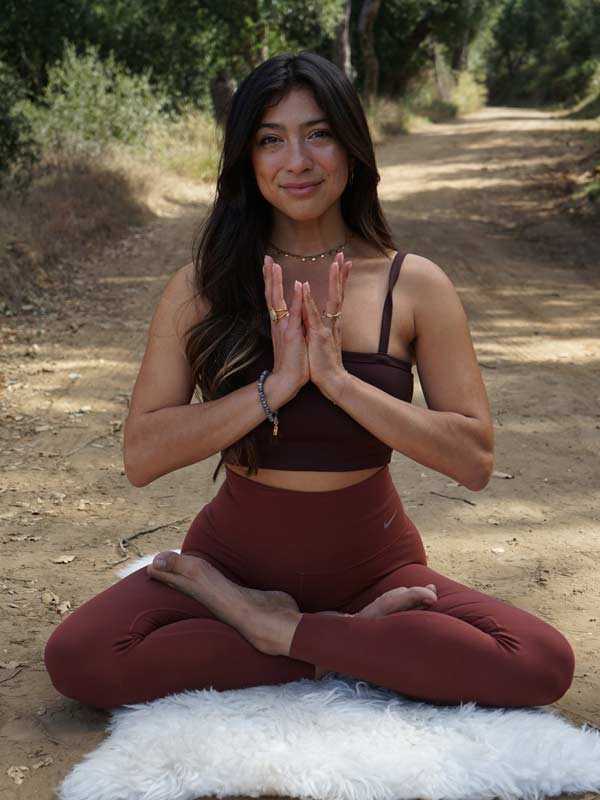LATINAS WHO MEDITATE
Interview with founder Natalie Valle
PROFILES
How did you end up on this wellness journey?
In high school, I had an unhealthy relationship with food, and I became very curious about food and fitness. It began as a pretty intense journey with disordered eating and even teetered into a little bit of substance abuse. In college, I really hit a low point. I needed an extra credit for my degree, so I thought I’d just take an exercise elective. I’d do something easy, something that won’t be any work.
The teacher ended up being a yoga instructor, so for a whole semester, I dove headfirst into yoga. I’ll never forget my first savasana. I’ll never forget laying down and feeling so much compassion for my body and such a connection with my body, because historically, my exercise routine was out of almost punishment, right? Like, I want to look this way, so I need to work hard to look this way. Yoga gave me this approach of feeling my body and moving my body and doing it in a way that incorporated gratitude. After I graduated college, I was already on my healing journey. I learned about meditation and that I could soothe my nervous system and find ways to feel better.
I took a sound practitioner course and on day one of that training, something sparked within me that completely shifted the trajectory of my life. Even though yoga was my first love as a practice for myself, when I stepped into teaching, it was actually sound baths.
What is unique about being a Latina healer? Do you notice anything different?
Being a Latina in the wellness space, my experience has been unique in the sense that I feel very blessed and privileged. I had a lot of people rooting for me and supporting me. Not everybody has that experience. While I may have carved a seat at the table for myself and I feel comfortable in those spaces, sometimes being the only Latina woman or sometimes the only BIPOC person in the room, not everybody feels comfortable in those spaces. Not everybody feels welcomed.
There are some incredible healers, and we all have indigenous roots. As a Latina woman, pulling from the wisdom of my ancestors has been so potent. We think about smudging, burning a sacred herb like palo santo, tobacco, or sage—this is something that our ancestors did to cleanse the energy, to clear for ceremony. It’s been a really beautiful thing to honor the ancestral teachings and learn about them. When I practice them, I feel connected to them.
I feel proud that as Latinos and Latinas, there is so much medicine that we can tap into from our ancestral roots that is unique to our DNA and our bloodlines. I feel like these practices were gifted to me from my ancestors. As a Latina woman, there was a craving to see more folks that looked like me so I could relate to them. There’s a lot of religion and Catholicism within the Latino culture that perhaps can be a barrier of entry to some wellness practice, so it helps if we can find solidarity and not feel so alone going through it.
Our culture does have religion as an institution and it could cause conflicts based on the ways of our ancestors. So how can you find a balance between both? And at the end of the day, whether it’s religion or spiritual practice, it’s all going to the same path of the divine, of the divinity, of being connected, and just being the best human you can possibly be.
I think the other part of being a Latina in the wellness space that maybe doesn’t get talked about as much is the paradigm that a lot of children of immigrants live in. If you are a child of immigrants or an immigrant yourself, there’s almost this badge of honor of working hard—of earning your place, earning what you have. Because of that, my parents worked really hard. They were immigrants. They had nothing so they really value hard work. Wellness and self-care were never a part of their lifestyle. They were never things that they considered necessary in what they consider a good life. For them, it was like having a good job, a home, a healthy family, food, and really survival. For children of immigrants, it also can be challenging to adopt the mindset of self-care when all our parents and grandparents have known is survival, and that can sometimes hinder people’s self-care. It wasn’t taught at my home because my parents were busy surviving.
It really is a privilege to be in a place where my whole life revolves around taking care of my mental health and my body. I’m standing on the shoulders of my parents and my grandparents and great-grandparents who sacrificed their lives to make sure that their children had everything that they needed.
Children of immigrants now have that privilege to change the narrative and their wellbeing. How did you come up with Latinas Who Meditate?
The name Latinas Who Meditate came to me at the height of the pandemic. It was almost this spark of inspiration. But I did nothing with it for years—it sat dormant and I forgot it existed. Last year, I was signed by Nike and during my onboarding, we had a diversity, equity, and inclusion workshop. It dawned on me that after five years in the industry, there was a gap in the demographic of clients that I was serving, primarily due to accessibility and inclusivity. I was inspired, and felt now through Nike, I was supported and I had the resources. Latinas Who Meditate popped back into my mind again, and I was like, “That’s it!”
So that’s kind of the creation story of it. It’s very clear now what it was meant to be: a community that lives within the love and alchemy offerings, but takes more of a being of service to the community, to the collective, to empower Latina women on their journeys. It’s so sweet because once you have your network, your network continues to have a network, and it widens up opportunities.
What are you looking forward to for the future?
I look forward to the reintegration and honoring of the elders. Moving into a place where we don’t learn from the person who has the most followers on social media, we learn from the person who has the most years of wisdom, who has lived studying the teachings of those who came before them. The reintegration of the medicine people into our culture, into our practice. Social media has been such a beautiful gift to give these elders and these wise medicine people a platform to share the medicine that they know now that it is safe for them to come out and be in the public space again.
If you had to pick one word, how would you describe the future?
Regenerative. Regenerative is traditionally known as the process of renewal and restoration, whether that is through the ecosystem or our own cells and tissues. The way that we’re moving as a species, as a collective, is we need to embrace the natural process of regeneration, to not only heal ourselves from a physical, emotional, mental, spiritual perspective, but also heal our species and our planet. I would like to describe my work as regenerative, to give people space to restore, to renew, and also to contribute to the whole of regeneration.
Learn more:
loveandalchemy.com
@latinaswhomeditate

